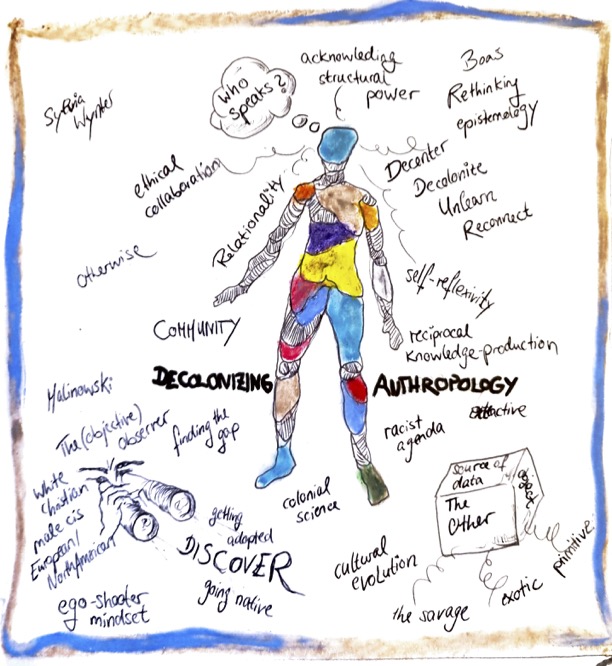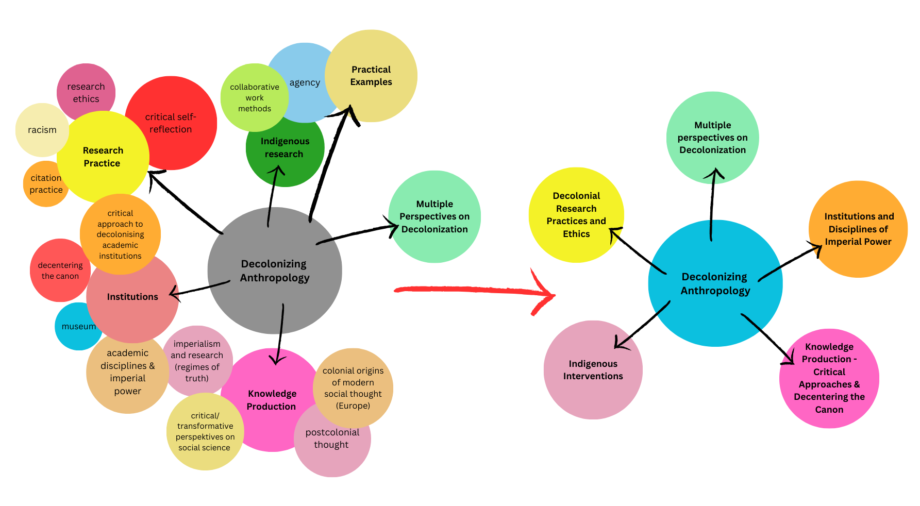Toolbox
Approaches to Decolonizing Anthropology
„Decolonization, which sets out to change the order of the world, is, obviously, a program of complete disorder. But it cannot come as a result of magical practices, nor of a natural shock, nor of a friendly understanding. Decolonization, as we know, is a historical process: that is to say it cannot be understood, it cannot become intelligible nor clear to itself except in the exact measure that we can discern the movements which give it historical form and content.“
Frantz Fanon, The Wretched of the Earth, 36.[1]
„(…) the ubiquity of ‘decolonisation’ in all areas of thought – from literature, linguistics and philosophy, to politics, economics, sociology, psychology and medicine – indicates that either the idea packs an explanatory and/or analytical punch like no other, or it has simply become a catch-all trope, often used to perform contemporary ‘morality’ or ‘authenticity’.“
Olúfẹ́mi Táíwò, Against Decolonisation: Taking African Agency Seriously, 4.[2]
What does it mean to ‘decolonize’ – not as an event but a process, a program of complete disorder? Over the course of the winter semester 2023/24, the participants and speakers of the digital lecture series “Decolonizing Anthropology” have engaged with multiple perspectives and approaches to the decolonization of anthropology as a discipline, its research methods and ethics, and the institutions that produce anthropological knowledge.

© Hannah Maria Reupert
During these discussions, an abundance of books, articles, guidelines, and best practices were shared, which we want to make available here as an incomplete collection of tools that can grow and be revised throughout the second part of the lecture series in the summer semester 2024 and beyond. In an attempt to structure the various resources, we have categorized them into Multiple Perspectives on Decolonization, Decolonial Research Practices and Ethics, Indigenous Interventions, Knowledge Production – Critical Approaches & Decentering the Canon, and Institutions and Disciplines of Imperial Power. Our process of categorization and mapping is visualized below.

© Hannah Maria Reupert and Amelie Greefe
These categories do not serve as a break-down of what decolonization is. They are not static and often overlap. As the collection grows, we might have to adapt them. You are welcome to participate in this process and to suggest further resources in the comments. Please register here to join the second part of the digital lecture series.
Multiple Perspectives on Decolonization
Jansen, Jonathan D., ed. 2019. Decolonisation in Universities: The Politics of Knowledge. Johannesburg: Wits University Press. https://www.cambridge.org/core/books/decolonisation-in-universities/8E7FB99752D7EEE9D2E616BB6EB62A40.
‘Rassismus in Der Wissenschaft – Decolonising – Perspektiven’. n.d. https://padlet.com/seminar_rawi/rassismus-in-der-wissenschaft-decolonising-perspektiven-4uyj0a9x7aa1nbjc.
The River & Fire Collective, 2021. ‘The Fires Within Us and the Rivers We Form’. Teaching Anthropology 10 (4): 92–109. https://doi.org/10.22582/ta.v10i4.627.
Táíwò, Olúfẹ́mi. 2022. Against Decolonisation: Taking African Agency Seriously. African Arguments. London: Hurst & Company. https://www.hurstpublishers.com/book/against-decolonisation/.
Tuck, E., and K. Wayne Yang. 2012. ‘Decolonization Is Not a Metaphor’. In , 1:1–40. Decolonization: Indigeneity, Education & Society 1. https://clas.osu.edu/sites/clas.osu.edu/files/Tuck%20and%20Yang%202012%20Decolonization%20is%20not%20a%20metaphor.pdf.
Decolonial Research Practices and Ethics
Burman, Anders. 2018. ‘Are Anthropologists Monsters? An Andean Dystopian Critique of Extractivist Ethnography and Anglophone-Centric Anthropology’. HAU: Journal of Ethnographic Theory 8 (1–2): 48–64. https://doi.org/10.1086/698413.
Castillo, Rosa Cordillera A. 2022. ‘The Past, Present, and Future Entangled: Memory-Work as Decolonial Praxis’. In Decolonial Enactments in Community Psychology, edited by Shose Kessi, Shahnaaz Suffla, and Mohamed Seedat, 253–71. Community Psychology. Cham: Springer. https://link.springer.com/chapter/10.1007/978-3-030-75201-9_13.
Castillo, Rosa Cordillera A., June Rubis, and Antony George Pattathu. 2023. ‘Critical Research Ethics as Decolonial Praxis’. International Quarterly for Asian Studies Vol. 54 No. 1 (April): 21-37 Pages. https://doi.org/10.11588/IQAS.2023.1.21746.
Fleschenberg, Andrea, Ahsan Kamal, Rosa Cordillera A. Castillo, Sarah Holz, and Abida Bano. 2023. Negotiating Research Ethics in Volatile Contexts, Part II. Vol. Vol. 54 No. 1. International Quarterly for Asian Studies. https://hasp.ub.uni-heidelberg.de/journals/iqas/issue/view/1172.
Fleschenberg, Andrea, Kai Kresse, and Rosa Cordillera Castillo, eds. 2023. Thinking with the South: Reframing Research Collaboration amid Decolonial Imperatives and Challenges. 1st ed. Zmo-Studien 44. Boston: De Gruyter. https://www.degruyter.com/document/doi/10.1515/9783110780567/html?lang=en.
Göpfert, Mirco, ed. n.d. ‘Seminar Zu “Rassismus in Der Wissenschaft” -Herausforderung Der Vorbereitung Und Durchführung Rassismuskritischer Feldforschung’. BA- und MA-Studierende der Ethnologie/Sozial- und Kulturanthropologie an der Goethe-Universität Frankfurt. https://etherpad.wikimedia.org/p/rassismuskritische_Feldforschung.
‘The Anti-Oppression Network – Safer Space Policies for Working Together’. The Anti-Oppression Network (blog). https://theantioppressionnetwork.com/resources/saferspacepolicy/.
Indigenous Interventions
Chilisa, Bagele. 2020. Indigenous Research Methodologies. Second edition. Los Angeles London New Delhi Singapore Washington DC Melbourne: SAGE. https://dokumen.pub/qdownload/indigenous-research-methodologies-2nbsped-1483333477-9781483333472.html.
Collaborative Indigenous Research Digital Garden
De Beer, Josef. 2019. The Decolonisation of the Curriculum Project: The Affordances of Indigenous Knowledge for Self-Directed Learning. Cape Town, South Africa: AOSIS. https://www.google.com/url?sa=t&source=web&rct=j&opi=89978449&url=https://library.oapen.org/bitstream/id/1dee70a8-3332-4f77-ac77-62459bef544b/978-1-928523-18-5.pdf&ved=2ahUKEwjr06L3i5eFAxUn-AIHHazAC5oQFnoECBEQAQ&usg=AOvVaw24EBkFNfbxQxxmhnpllxHI.
MAI Journal: A New Zealand Journal of Indigenous Scholarship
Rubis, June Mary. 2020. ‘The Orang Utan Is Not an Indigenous Name: Knowing and Naming the Maias as a Decolonizing Epistemology’. Cultural Studies 34 (5): 811–30. https://doi.org/10.1080/09502386.2020.1780281.
Smith, Linda Tuhiwai. 2008. Decolonizing Methodologies: Research and Indigenous Peoples. 12. impression. London: Zed Books [u.a.]. https://nycstandswithstandingrock.files.wordpress.com/2016/10/linda-tuhiwai-smith-decolonizing-methodologies-research-and-indigenous-peoples.pdf.
Knowledge Production – Critical Approaches & Decentering the Canon
Bhambra, Gurminder K. 2014. ‘A Sociological Dilemma: Race, Segregation and US Sociology’. Current Sociology 62 (4): 472–92. https://doi.org/10.1177/0011392114524506.
Boatcă, Manuela. 2013. ‘“From the Standpoint of Germanism”: A Postcolonial Critique of Weber’s Theory of Race and Ethnicity’. In Political Power and Social Theory, edited by Julian Go, 55–80. Emerald Group Publishing Limited. https://doi.org/10.1108/S0198-8719(2013)0000024009.
Chakrabarty, Dipesh. 2008. Provincializing Europe: Postcolonial Thought and Historical Difference. Reissue. Princeton Studies in Culture, Power, History. Princeton, NJ: Princeton University Press. https://www.degruyter.com/document/doi/10.1515/9781400828654/html?lang=en.
Connell, Raewyn. 2007. Southern Theory: The Global Dynamics of Knowledge in Social Science. Cambridge: Polity. https://dokumen.pub/qdownload/southern-theory-the-global-dynamics-of-knowledge-in-social-science-9781741753578.html.
‘Global Approach to Social Theory – Impetus: “Why Is My Curriculum White?”’: https://globalsocialtheory.org/about/.
Go, Julian. 2016. Postcolonial Thought and Social Theory. New York, NY: Oxford University Press. https://www.google.com/url?sa=t&source=web&rct=j&opi=89978449&url=https://alfredocesarmelo.files.wordpress.com/2015/03/go-julian-postcolonial-thought-and-social-theory-oxford-university-press-2016.pdf&ved=2ahUKEwjm-6rvj5eFAxXT7gIHHVYdAy4QFnoECDMQAQ&usg=AOvVaw0dkmi1-ceJ8ShSo_LlcUfu.
Iroulo, Lynda Chinenye, and Juliana Tappe Ortiz. 2022. ‘Dear German Academia: What Is Your Role in African Knowledge Production?’ Africa Spectrum 57 (1): 72–82. https://doi.org/10.1177/00020397221085982.
Mignolo, Walter D. 2007. ‘DELINKING: The Rhetoric of Modernity, the Logic of Coloniality and the Grammar of de-Coloniality’. Cultural Studies 21 (2–3): 449–514. https://www.tandfonline.com/doi/full/10.1080/09502380601162647
Ndlovu-Gatsheni, Sabelo J. 2021. ‘The Cognitive Empire, Politics of Knowledge and African Intellectual Productions: Reflections on Struggles for Epistemic Freedom and Resurgence of Decolonisation in the Twenty-First Century’. Third World Quarterly 42 (5): 882–901. https://www.tandfonline.com/doi/full/10.1080/01436597.2020.1775487
Ndlovu-Gatsheni, Sabelo J. 2023. ‘Intellectual Imperialism and Decolonisation in African Studies’. Third World Quarterly, May, 1–18. https://doi.org/10.1080/01436597.2023.2211520.
Steinmetz, George. 2023. The Colonial Origins of Modern Social Thought: French Sociology and the Overseas Empire. Princeton Modern Knowledge. Princeton, New Jersey: Princeton University Press. https://www.degruyter.com/document/doi/10.1515/9780691237435/html?lang=de#contents.
Institutions and Disciplines of Imperial Power – Museums
Assilkinga, M., L. Breuer, R.T. Fossi, A. Gouaffo, Y. LeGall, Y.K. Matchinda, F.M.C. Refem, et al. 2023. Atlas der Abwesenheit: Kameruns Kulturerbe in Deutschland. Ed. Bénédicte Savoy, Andrea Meyer, and Albert Gouaffo. Berlin: Reimer. doi.org/10.11588/arthistoricum.1219
Folga-Januszewska, Dorota, Martina Lehmannová, Jasna Gaburová, Elke Kellner, and Paweł Jaskanis, eds. 2019. Museums and Identities: Planning an Extended Museum. Muzeologia, vol. 20. Warsaw: Museum of King Jan III’s Palace at Wilanów. https://www.google.com/url?sa=t&rct=j&q=&esrc=s&source=web&cd=&cad=rja&uact=8&ved=2ahUKEwjSh6SWt8uEAxUeQvEDHYIFCjwQFnoECBMQAQ&url=https%3A%2F%2Fsklep.wilanow-palac.pl%2Fpl%2Fp%2Ffile%2F77ac081ffc156f0eb00d555ed6fda990%2FMuseums-and-Identities.-Planning-an-Extended-Museum-ebook.pdf&usg=AOvVaw1TW11Cvyvszvts1KzUfwBA&opi=89978449.Kazeem, Belinda, Charlotte Martinz-Turek, and Nora Sternfeld. 2009. Das Unbehagen im Museum: postkoloniale Museologien. Schnittpunkt, Band 3. Wien: Verl. Turia + Kant. https://www.schnitt.org/_media/books/schnittpunkt_3_Unbehagen_im_Museum.pdf.
Oswald, Margareta von. 2022. Working through Colonial Collections: An Ethnography of the Ethnological Museum in Berlin. Leuven: Leuven University Press. https://library.oapen.org/handle/20.500.12657/58949
“Digital Benin“: Database with over 5,000 „objects“ from the Kingdom of Benin in 136 institutions.
Institutions and Disciplines of Imperial Power – Universities
Ahmed, Sara. 2012. On Being Included: Racism and Diversity in Institutional Life. Durham ; London: Duke University Press. https://static1.squarespace.com/static/5f19ed0382525a1ca134124a/t/5f8b86ebe71556378586ee75/1602979563714/Sara+Ahmed+-+On+Being+Included_+Racism+and+Diversity+in+Institutional+Life+%282012%2C+Duke+University+Press%29+-+libgen.lc.pdf.
Barnett-Naghshineh, Olivia, and Antony Pattathu. 2021. ‘Introduction to the Special Issue Decolonizing Anthropology: Race, Emotions and Pedagogies in the European Classroom’. Teaching Anthropology 10 (4): 1–16. https://doi.org/10.22582/ta.v10i4.638.
Castillo, Rosa Cordillera A., and Hansjörg Dilger. 2022. ‘Ethics as Embodied Practice: Reflexivity, Dialogue and Collaboration – in Conversation with Prof. Dr. Hansjörg Dilger’. International Quarterly for Asian Studies Vol. 53 No. 4 (December): 505-518 Pages. https://doi.org/10.11588/IQAS.2022.4.20796.
Hammana, Zouhair, and Victoria Louisa Klinkert. 2021. ‘Glitching the University Machine’. Teaching Anthropology 10 (4): 36–46. https://doi.org/10.22582/ta.v10i4.621.
Shahjahan, Riyad A., and Clara Morgan. 2016. ‘Global Competition, Coloniality, and the Geopolitics of Knowledge in Higher Education’. British Journal of Sociology of Education 37 (1): 92–109. https://doi.org/10.1080/01425692.2015.1095635.
Footnotes
[1]Fanon, Frantz. The Wretched of the Earth. New York: Grove Press, 1963.
[2]Táíwò, Olúfẹ́mi. Against Decolonisation: Taking African Agency Seriously. London: Hurst & Company, 2022.

































